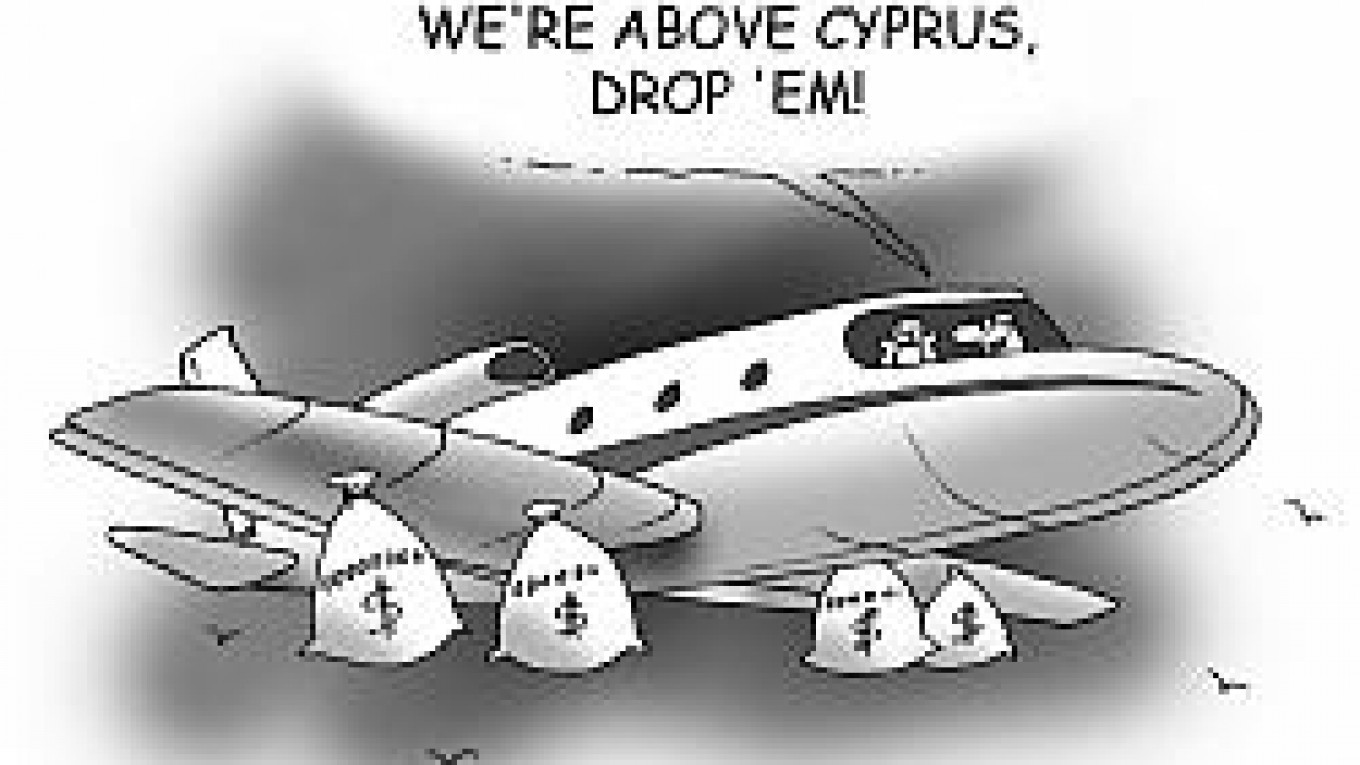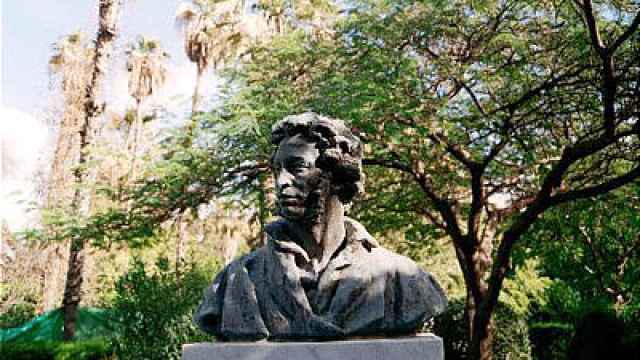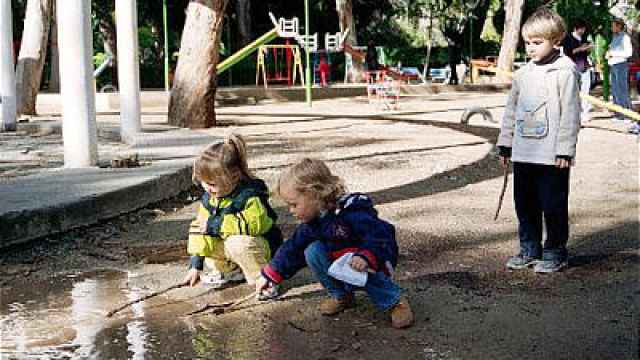Large Russian women wearing tracksuits and carrying bags full of goods crowded into restaurants, recalls Irina Kosareva, a local business consultant. Without asking the owners' permission, the women would spread out their binoculars, irons and matryoshka dolls on the tables, loudly urging the patrons to buy. Cypriots were puzzled.
"We felt so ashamed for our fellow countrymen," said Kosareva, who moved here with her husband, Vladimir, in 1989 when he came to play professional soccer. "We were ashamed of [former President Boris] Yeltsin, whom they showed drunk on TV. Our Cypriot friends were laughing and we didn't know what to say."
Things have changed since then. Today, Russians lounge by the pool at ritzy hotels, buy furs in upscale shops, zip around in Mercedes Benzes and put their money in villas on the sea. But while the nouveau riche may be the most visible of Cyprus's permanent Russian community -- estimates range between 10,000 and 37,000 people -- Russians of more modest means have found a home on this balmy Mediterranean island.
Russians are choosing Cyprus for a variety of reasons. The tax rate for offshore companies is minimal, the climate is warm, and since 1996, it has been one of the few countries in Europe that doesn't require visas for Russians staying here for up to three months. On top of all that, the crime rate is low.
|
Russell Working / For MT Vladimir Kosarev initially came to Cyprus to play professional soccer. He and his family have stayed on, and today he works as a soccer coach. |
Vladimir Zatsepin, the Russian Embassy's press attache, says between 10,000 to 15,000 Russians live here, though the Cypriot Russian newspaper Vestnik Kipra puts the number at 37,000. These include people married to Cypriots and exclusively Russian families. The latter are mostly the families of businessmen who have opened the 1,200 to 1,300 Russian-owned offshore companies in Cyprus.
What lures Russian and other businesses to Cyprus is a tax rate of 4.25 percent for offshore companies registered here. Domestic companies, on the other hand, pay 25 percent, but in accordance with European Union requirements, the rate will be evened out. Cyprus hopes the EU will approve a uniform tax rate of 10 percent, which would still be the lowest in the region.
It currently costs $3,500 to register an offshore company in Cyprus. And out of the 1,200 registered Russian companies, "only a few hundred are actually alive and working, and very few have offices here," said Yury Pyanikh, president of the Association of Russian Businessmen in Cyprus.
Indeed, Cyprus is home to a unique phenomenon: Russians show up with several million dollars and file papers to open a company, yet don't really do any business, said one Cypriot businessman. They call themselves businessmen, but they simply spend money accumulated in Russia. They buy luxury cars, big homes and fancy offices. "But eventually they run out of money and they go home," he said.
|
Russell Working / For MT Originally from Siberia, Marina enjoys her job in this Cyprus Internet cafe and wants to stay. |
They have a reason to be nervous, said Zatsepin, the Russian press attache. They are uneasy about what will follow after Cyprus joins the EU and a new visa regime is introduced. Others say that even here, wealthy businessmen are nervous about Russian tax officials, who harass companies with excessive inspections and hit them up for bribes. One Vladivostok man relocated here after a smear campaign in the press led by former Governor Yevgeny Nazdratenko. Burned in the past, he keeps a low profile and refuses to talk to the press.
Cyprus isn't just a magnet for Russian money. The tiny island is one of the biggest investors in the Russian economy -- the result of a treaty between the two countries avoiding double taxation, said Pyanikh. For this reason, many companies from throughout Europe that do business in Russia use Cyprus as their base. It has a stable Western banking system and offers them a back door into Cyprus. The annual trade turnover between the two countries is $300 million. Cyprus ships agricultural products and clothes to Russia, while Russia exports timber, oil and metal.
Another important Russian export to Cyprus -- and perhaps the most obvious one -- are its tourists. Every year, 140,000 to 160,000 Russian tourists visit the island. Along the seaside in Limassol, restaurants, shops and travel agencies post menus and signs in Russian. (Strangely, in a warm country, many shops sell Russians fur coats from Greek manufacturers.) "Russia is one of the few countries whose wave of tourists to Cyprus didn't diminish after Sept. 11," Zatsepin said.
Sometimes celebrities can be spotted among the incoming throngs from Russia. One local woman recalls seeing State Duma Deputy Vladimir Zhirinovsky striding down the beach in baggy, knee-length shorts with his bodyguards in tow. And Moscow Mayor Yury Luzhkov is said to visit every summer.
|
Russell Working / For MT A bust of Pushkin sits proudly in this Limassol park. |
Marina first visited Cyprus in September with no plans to stay long-term. But since the college graduate with a degree in management and economics couldn't find work at home, she was thrilled to get a job at the Internet cafe.
"Here it's good for my professional growth. I'm improving my English, and I'm learning Greek and about computers," said Marina, who didn't want to give her last name for fear of running into visa troubles. Cypriot authorities periodically raid restaurants and offices and deport Russians living here illegally within 24 hours.
The newspapers often print sad tales of Russians kicked out of the country. In November, local police booted out a group of Russians who had overstayed their visas. And in December, a 52-year-old Russian woman was expelled after her Cypriot husband secretly divorced her at a visa hearing at which neither she nor her lawyer was present.
In response to the constant flow of tourists and the more permanent Russian population on Cyprus, Pyanikh's business association tries to organize cultural and social activities bringing Russians together. His group raised the money to build a Russian Orthodox church in Limassol and sponsored a drive to place a monument to beloved poet Alexander Pushkin in the city's municipal park.
|
Russell Working / For MT Russian children are a common sight in many of the Mediterranean island's tree-lined parks. |
Appealing to some homegrown taste buds and a hint of nostalgia, Burtsev stocks his shops with homemade pelmeni, pickled herring, pickled cucumbers and tomatoes, mustard, canned meat, barley, sunflower seeds and Soviet champagne. Most of his products are imported, of course -- not from Russia, but from Israel, where the Russian community numbers in the hundreds of thousands.
Burtsev also offers a large selection of Russian and Soviet movies, and his shelves are full of Russian novels ranging from mysteries to contemporary literary fiction. His world, like his shop, is mostly Russian. "If you don't have a circle of friends here, you might go crazy," he said.
But even those expatriates who have assimilated more successfully into the local landscape sometimes long for home. Longtime resident Kosareva recalls spending her first six weeks here sitting on a balcony and pining for her Russian friends. But when she visited Moscow later that winter, she was welcomed by a snowstorm, rude people and bare shelves in the stores. For the sake of her children, she decided she could adjust to life in the village of Larnaca, which over the past 12 years has grown into a town of 50,000. Over time, she came to love Cyprus.
Kosareva's husband now coaches in a youth soccer league and organizes winter training camps for Russian soccer teams. The Kosarevs consider Cyprus their home, and they have even applied for citizenship. Their daughter, Marina, 16, calls herself an English Cypriot, speaks five languages and has no intention of going back to Russia.
The Kosarevs have seen many changes over their 13 years in Cyprus. In Soviet times, the only Russians they saw came to the island on big ships -- and they were not even allowed to leave port.
"We would run to look at the Russians," said Kosareva.
Now it may be hard to go out her front door and not hear her native language, but Kosareva believes that this, too, may change.
Many Russian businesses will leave as economic conditions in Russia improve, said the business consultant. "If Moscow passes a tax amnesty covering capital that has fled Russia in the past decade, many Russians will reinvest in their homeland."
A Message from The Moscow Times:
Dear readers,
We are facing unprecedented challenges. Russia's Prosecutor General's Office has designated The Moscow Times as an "undesirable" organization, criminalizing our work and putting our staff at risk of prosecution. This follows our earlier unjust labeling as a "foreign agent."
These actions are direct attempts to silence independent journalism in Russia. The authorities claim our work "discredits the decisions of the Russian leadership." We see things differently: we strive to provide accurate, unbiased reporting on Russia.
We, the journalists of The Moscow Times, refuse to be silenced. But to continue our work, we need your help.
Your support, no matter how small, makes a world of difference. If you can, please support us monthly starting from just $2. It's quick to set up, and every contribution makes a significant impact.
By supporting The Moscow Times, you're defending open, independent journalism in the face of repression. Thank you for standing with us.
Remind me later.






